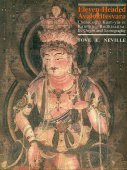Ten Powers: 1 definition
Introduction:
Ten Powers means something in Buddhism, Pali. If you want to know the exact meaning, history, etymology or English translation of this term then check out the descriptions on this page. Add your comment or reference to a book if you want to contribute to this summary article.
In Buddhism
General definition (in Buddhism)
Source: Buddhist Door: GlossaryThe Ten Powers of Buddha or Bodhisattva are the complete knowledge of 1. what is right or wrong in every condition 2. what is the karma of every being, past, present and future 3. all stages of dhyana liberation and samadhi 4. the powers and faculties of all beings 5. the desires or moral directions of every being 6. the actual condition of every individual 7. the direction and consequence of all laws 8. all causes of mortality and of good and evil in their reality 9. the end of all beings and Nirvana 10. the destruction of all illusion of every kindSee also (Relevant definitions)
Partial matches: Ten.
Full-text (+60): Tathagata Bala, Dasabala, Jnanabala, Dasabala Sutta, Sarvatragaminipratipad, Dashajnana, Apramanaguna, Parisodhana, Niryata, Dhyanavimokshasamadhisamapatti, Samagrya, Parishkara, Nanadhimukti, Silaguna, Indriyaparapara, Kriya, Parapravadin, Vaisharadya, Anabhibhuta, Tamas.
Relevant text
Search found 33 books and stories containing Ten Powers; (plurals include: Ten Powerses). You can also click to the full overview containing English textual excerpts. Below are direct links for the most relevant articles:
Maha Prajnaparamita Sastra (by Gelongma Karma Migme Chödrön)
III. There is no boastfulness in the buddha < [Part 3 - Appendices to the ten powers]
II. Why the buddha thinks highly of his ten powers < [Part 3 - Appendices to the ten powers]
V. Why distinguish between the powers and the fearlessnesses? < [Part 1 - The four fearlessnesses of the Buddha according to the Abhidharma]
The Great Chronicle of Buddhas (by Ven. Mingun Sayadaw)
Part 4 - Buddha (a Supremely Enlightened One) < [Chapter 2 - Rare Appearance of a Buddha]
Part 14 - The Ten Powers: Dasabala-ñāṇa < [Chapter 42 - The Dhamma Ratanā]
Part 16 - What is the Fruit of the Pāramīs < [Chapter 7 - On Miscellany]
Guhyagarbha Tantra (with Commentary) (by Gyurme Dorje)
Text 12.5 (Commentary) < [Chapter 12 (Text and Commentary)]
Text 1.5 (Commentary) < [Chapter 1 (text and commentary)]
Introduction 1: (A Single Supreme Emanational Buddha-body) < [Chapter 3 (text and commentary)]
Amarakoshodghatana of Kshirasvamin (study) (by A. Yamuna Devi)
Buddhism and Buddhist philosophy < [Chapter 4 - Cultural Aspects]
A Treatise on the Paramis (by Ācariya Dhammapāla)
Related products
